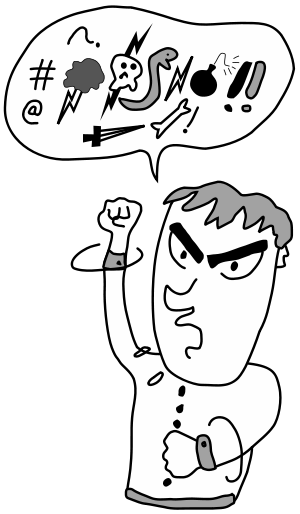Stuart's Daily Word Spot: Dialogue
 Image via Wikipedia
Image via WikipediaDialogue: noun – a work of literature constructedin conversational form; the part of a novel describing the conversationsbetween characters; verbal interchange or discussion; diplomatic contactbetween nations or blocs; valuable or constructive communication betweendifferent groups.
Dialogue can move a storyforward, increasing the pace, or it can be used to describe events, emotionsand people in a more subtle way than pure narrative. It also breaks up text onthe page, allowing white space to make the passage more appealing to the eye. Alot has been written about tag lines in dialogue and I admit to avoiding themwhenever possible. However, in long passages of dialogue, it's necessary toidentify the speakers from time to time so the reader doesn't become confusedabout who is speaking. Many beginners use adverbsin their tags or replace a simple 'he said', 'she said' with variations like,'shouted', 'cried', 'expostulated', 'avowed', exclaimed' and so on. Some thingsto remember about this: 'he/she said' rapidly becomes 'invisible' to thereader, supplying the clue to the identity of the speaker without drawingattention to the tag. Terms such as 'shouted', 'cried' and the rest aregenerally redundant if the dialogue is well written, as the words and contextwill describe the manner of delivery. And adverbs are best omitted from fictionwriting whenever possible. The general rule of thumb advised by most of thosein the know is that one adverb in a thousand words is quite enough. It's important to be awarethat dialogue in a story is not simply natural speech. If you listen to peopletalking - really listen – you'll observe numerous pauses for thought, often punctuatedby 'redundant' words to fill the space whilst the speaker thinks; 'er', 'youknow?', 'like' are examples of such fillers. Also, people repeat themselves andfrequently speak in banal terms when holding conversations. The job of thewriter is to compose dialogue that reflects the nature of the character withoutreducing the text to boring passages of meaningless twaddle. If a writer canmake his characters into poets as they speak, without resorting to overblownlanguage, there's a good chance that the resultant dialogue will captivate thereader.Another aspect of dialoguewriting often overlooked is the use of contractions. Using the 'correct' formsof phrases that are usually contracted will make your dialogue sound stilted inthe mind of the reader. But that doesn't mean that every instance of suchphrases should be contracted; balance is important.Similarly, the use ofdialect and foul language in dialogue needs to be well regulated if it is notto either confuse or offend the reader. A text peppered with dialect only fullyunderstood by the people who've lived all their lives in the hamlet of NetherPuddleton is likely to have your readers scratching their heads in an effort todiscern meaning. And a block of dialogue with every alternate word as anexpletive will simply irritate and possibly offend many readers. As the modernexpression has it; less is more.
'Get your skinny arse over'ere!' Carter yelled angrily. Here, 'yelled' and'angrily' are unnecessary, as the words and punctuation send the message to thereader.
'Come; place your gentlehand in mine and I'll lead you to the dance.'The reader here knows thatthe speaker is a male, talking to a female. So, if only these two characters appearin this part of the story, no tag is needed to identify the speaker.
'I erm, well, like, I wasabout to, you know, I thought if you, like, erm, well, would like to maybe, ermcome to dinner with me, like?' A little exaggerated; butthis is what a lot of natural speech is like.
'I wondered if you would, maybe,er, have dinner with me?' The same sentiment, butthis time the speaker comes across as a shy or diffident individual asking aquestion of someone admired, and the reader doesn't have to plough through allthe extraneous stuff. The manner of speech, the hesitation and lack ofconfidence are all conveyed by the words used.
'Tha's a raight fotherynugtent, an' there's nay doot ya'll fratter yon gloogs if tha nivver gits outon thither blitherpile.' That the speaker is beinginsulting is clear. However, the meaning of the sentence is impossible todiscern (largely because some of the language used here is invented). But itillustrates the over-use of the dialect form.
'I cannot agree with you,because my view does not tie in with the way you are arguing or with the horribleway you are stating it.'This, apart from soundingpompous, is stilted and unnatural. 'I can't agree with you,because my view doesn't tie in with the way you're arguing or the horrible wayyou're stating it.'This is an improvement.But the following might make for better dialogue, without altering the meaning:'I can't agree; our viewsdon't match and the way you state them is offensive.'
As a final point; notethat punctuation belonging to the speech is included inside the quotationmarks.
'If I ask you nicely, willyou give me what I want?'
But: 'I hope he'll give mewhat I want.' Was she bold enough to ask?

Published on November 04, 2011 11:30
No comments have been added yet.



